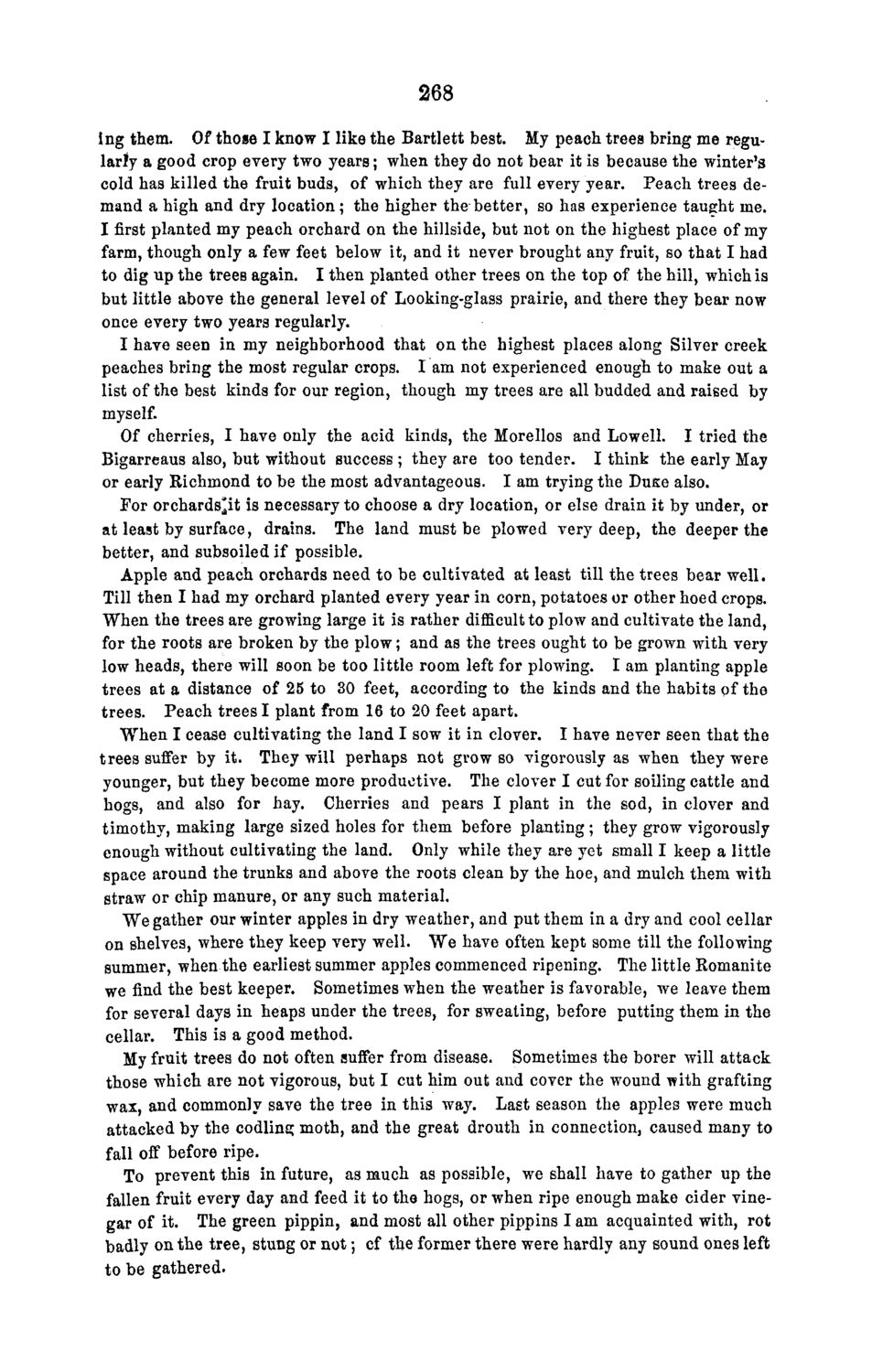| |
| |
Caption: Board of Trustees Minutes - 1868
This is a reduced-resolution page image for fast online browsing.

EXTRACTED TEXT FROM PAGE:
268 ing them. Of those I know I like the Bartlett best. My peach trees bring me regularly a good crop every two years; when they do not bear it is because the winter's cold has killed the fruit buds, of which they are full every year. Peach trees demand a high and dry location; the higher the better, so has experience taught me. I first planted my peach orchard on the hillside, but not on the highest place of my farm, though only a few feet below it, and it never brought any fruit, so that I had to dig up the trees again. I then planted other trees on the top of the hill, which is but little above the general level of Looking-glass prairie, and there they bear now once every two years regularly. I have seen in my neighborhood that on the highest places along Silver creek peaches bring the most regular crops. I am not experienced enough to make out a list of the best kinds for our region, though my trees are all budded and raised by myself. Of cherries, I have only the acid kinds, the Morellos and Lowell. I tried the Bigarreaus also, but without success ; they are too tender. I think the early May or early Richmond to be the most advantageous. I am trying the Du&e also. For orchards*it is necessary to choose a dry location, or else drain it by under, or at least by surface, drains. The land must be plowed very deep, the deeper the better, and subsoiled if possible. Apple and peach orchards need to be cultivated at least till the trees bear well. Till then I had my orchard planted every year in corn, potatoes or other hoed crops. When the trees are growing large it is rather difficult to plow and cultivate the land, for the roots are broken by the plow; and as the trees ought to be grown with very low heads, there will soon be too little room left for plowing. I am planting apple trees at a distance of 25 to 30 feet, according to the kinds and the habits of the trees. Peach trees I plant from 16 to 20 feet apart. When I cease cultivating the land I sow it in clover. I have never seen that the trees suffer by it. They will perhaps not grow so vigorously as when they were younger, but they become more productive. The clover I cut for soiling cattle and hogs, and also for hay. Cherries and pears I plant in the sod, in clover and timothy, making large sized holes for them before planting; they grow vigorously enough without cultivating the land. Only while they are yet small I keep a little space around the trunks and above the roots clean by the hoe, and mulch them with straw or chip manure, or any such material. We gather our winter apples in dry weather, and put them in a dry and cool cellar on shelves, where they keep very well. We have often kept some till the following summer, when the earliest summer apples commenced ripening. The little Romanite we find the best keeper. Sometimes when the weather is favorable, we leave them for several days in heaps under the trees, for sweating, before putting them in the cellar. This is a good method. My fruit trees do not often suffer from disease. Sometimes the borer will attack those which are not vigorous, but I cut him out and cover the wound with grafting wax, and commonly save the tree in this way. Last season the apples were much attacked by the codling moth, and the great drouth in connection, caused many to fall off before ripe. To prevent this in future, as much as possible, we shall have to gather up the fallen fruit every day and feed it to the hogs, or when ripe enough make cider vinegar of it. The green pippin, and most all other pippins I am acquainted with, rot badly on the tree, stung or not; cf the former there were hardly any sound ones left to be gathered.
| |